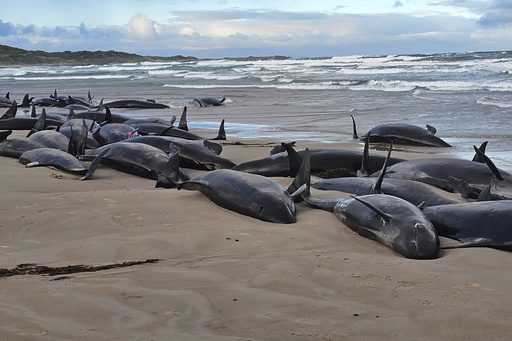MELBOURNE, Australia — Marine specialists have lost hope in the attempt to save over 150 false killer whales that became stranded on a remote Tasmanian beach, as announced by local authorities on Wednesday.
Veterinarians and marine experts gathered near the Arthur River on Tasmania’s northwestern coastline, where 157 whales were initially spotted stranded on a surf beach on Tuesday afternoon, according to the Department of Natural Resources and Environment.
According to incident controller Shelley Graham, unfavorable oceanic and weather conditions that hindered rescue efforts were expected to continue for several days. “We have ventured into the water this morning and tried to relocate and refloat two of the whales but were unsuccessful due to the challenging ocean conditions preventing them from getting beyond the break. The whales continue to restrand,” Graham stated.
Marine biologist Kris Carlyon indicated that the decision had been made to euthanize the surviving whales. “The longer they remain stranded, the more they suffer. All other attempts have been ineffective,” Carlyon explained.
Initially, the department identified 136 survivors on Wednesday morning, but that number was quickly revised down to 90 as the situation evolved. The stranded whales, which included youngsters weighing as little as 500 kilograms (approximately 1,100 pounds) and adults up to 3 metric tons (around 3.3 U.S. tons), posed an extreme challenge due to the beach’s inaccessibility, adverse ocean conditions, and difficulties in transporting specialized equipment to the isolated area.
Brendon Clark, a department liaison officer, noted that this stranding incident represented the first occurrence of false killer whales in Tasmania since 1974, when over 160 whales were found stranded near Stanley on the northwest coast. Although pilot whales are typically the species involved in strandings in Tasmania, Clark refrained from speculating about the factors contributing to this specific incident, mentioning that the carcasses of deceased whales would be examined for potential insights.
On Tuesday afternoon, a helicopter surveillance confirmed no other whales were present within 10 kilometers (6 miles) of the stranded group. Some of these whales may have remained stranded for as long as 48 hours by early Wednesday.
Local resident Jocelyn Flint reported that her son discovered the stranded whales around midnight while out shark fishing. She visited the scene before dawn and returned after sunrise, finding the whales too large to be refloated. “The water surged up and they were thrashing about. They’re simply dying, having sunk into the sand,” Flint shared on Wednesday morning. “I suspect it’s too late. There are young ones present, and many larger ones as well. It’s truly sad,” she added.
The previous year, 230 pilot whales stranded further south at Macquarie Harbor, while the largest mass stranding in Australian history occurred in the same harbor in 2020, when 470 long-finned pilot whales became trapped on sandbars, with most not surviving.
The exact causes behind such strandings remain largely unclear, though possibilities include disorientation from loud noises, illness, age, injury, evasion of predators, and inclement weather.




